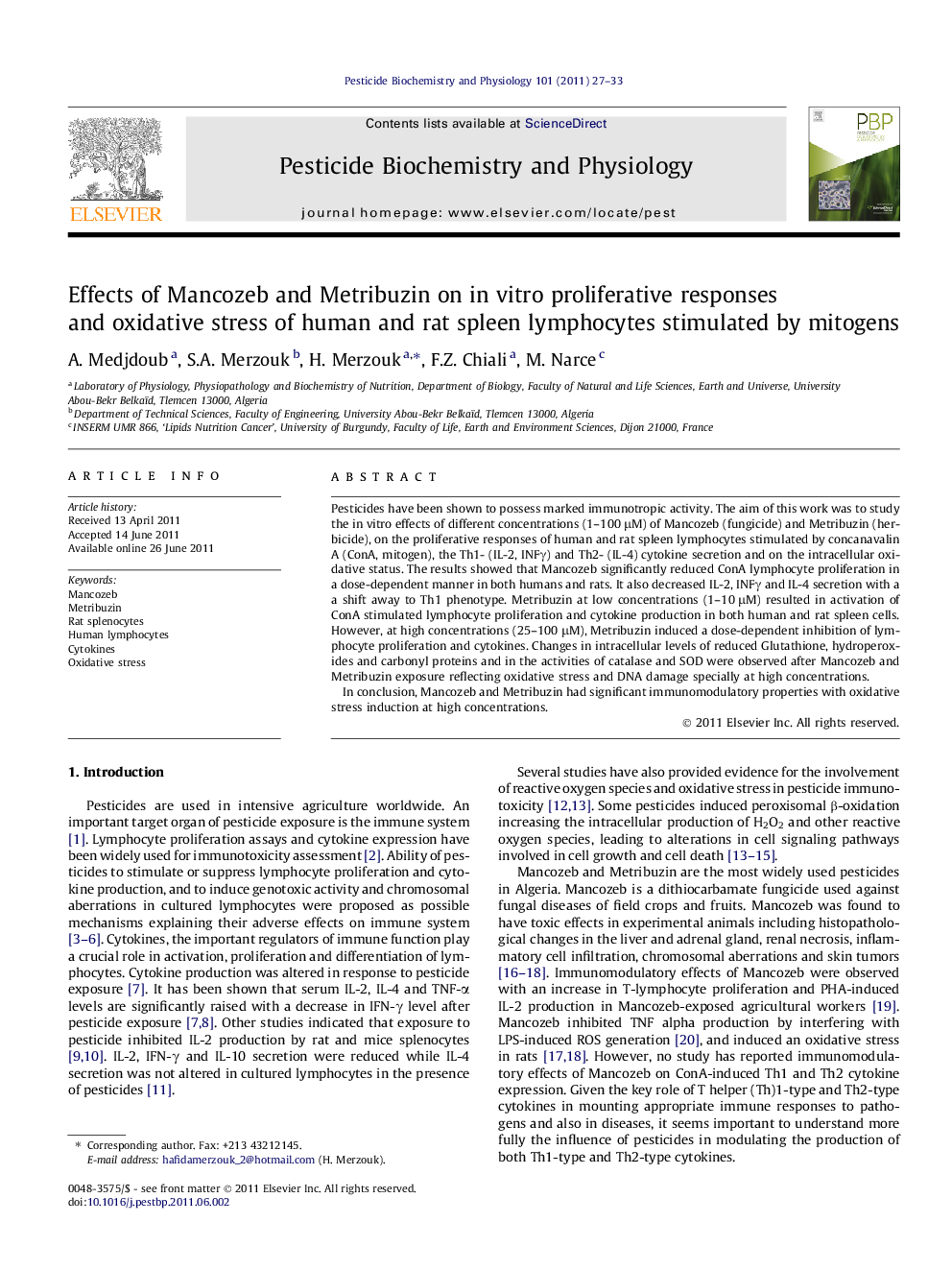| Article ID | Journal | Published Year | Pages | File Type |
|---|---|---|---|---|
| 2009448 | Pesticide Biochemistry and Physiology | 2011 | 7 Pages |
Pesticides have been shown to possess marked immunotropic activity. The aim of this work was to study the in vitro effects of different concentrations (1–100 μM) of Mancozeb (fungicide) and Metribuzin (herbicide), on the proliferative responses of human and rat spleen lymphocytes stimulated by concanavalin A (ConA, mitogen), the Th1- (IL-2, INFγ) and Th2- (IL-4) cytokine secretion and on the intracellular oxidative status. The results showed that Mancozeb significantly reduced ConA lymphocyte proliferation in a dose-dependent manner in both humans and rats. It also decreased IL-2, INFγ and IL-4 secretion with a a shift away to Th1 phenotype. Metribuzin at low concentrations (1–10 μM) resulted in activation of ConA stimulated lymphocyte proliferation and cytokine production in both human and rat spleen cells. However, at high concentrations (25–100 μM), Metribuzin induced a dose-dependent inhibition of lymphocyte proliferation and cytokines. Changes in intracellular levels of reduced Glutathione, hydroperoxides and carbonyl proteins and in the activities of catalase and SOD were observed after Mancozeb and Metribuzin exposure reflecting oxidative stress and DNA damage specially at high concentrations.In conclusion, Mancozeb and Metribuzin had significant immunomodulatory properties with oxidative stress induction at high concentrations.
Graphical abstractPesticides have been shown to possess marked immunotropic activity. The aim of this work was to study the in vitro effects of different concentrations (1–100 μM) of Mancozeb (fungicide) and Metribuzin (herbicide), on the proliferative responses of human and rat spleen lymphocytes stimulated by concanavalin A (ConA, mitogen), the Th1- (IL-2, INFγ) and Th2- (IL-4) cytokine secretion and on the intracellular oxidative status. The results showed that Mancozeb significantly reduced ConA lymphocyte proliferation in a dose-dependent manner in both humans and rats. It also decreased IL-2, INFγ and IL-4 secretion with a a shift away to Th1 phenotype. Metribuzin at low concentrations (1–10 μM) resulted in activation of ConA stimulated lymphocyte proliferation and cytokine production in both human and rat spleen cells. However, at high concentrations (25–100 μM), Metribuzin induced a dose-dependent inhibition of lymphocyte proliferation and cytokines. Changes in intracellular levels of reduced Glutathione, hydroperoxides and carbonyl proteins and in the activities of catalase and SOD were observed after Mancozeb and Metribuzin exposure reflecting oxidative stress and DNA damage specially at high concentrations.In conclusion, Mancozeb and Metribuzin had significant immunomodulatory properties with oxidative stress induction at high concentrations.Figure optionsDownload full-size imageDownload as PowerPoint slideHighlights► Mancozeb and Metribuzin have modulatory effects on human and rat spleen cell immune responses. ► Mancozeb reduced lymphocyte proliferation and cytokine secretion (IL-2, IL-4 and INFγ). ► Metribuzin exerted either stimulatory or inhibitory activity to the immune system. ► Mancozeb and Metribuzin induced oxidative stress and DNA damage specially at high concentrations.
